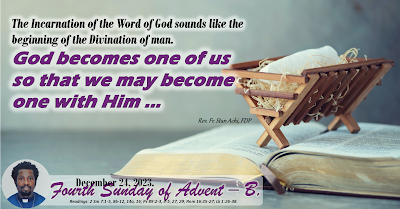"AND THE WORD WAS MADE FLESH..." Jn 1:14
December 24, 2023 Cf. Sunday.
Fourth Sunday of Advent – B.
“Behold, you will conceive in your womb and bear a son, and
you shall name him Jesus…” (Luke 1:31)
A Maltese proverb says: “We are all flesh and blood.” A
Cameroonian proverb adds: “You cannot produce one human being without uniting
two bodies.”
At Christmas, we celebrate a great mystery, the mystery of
the Incarnation of God's Son into our human nature. The Word of God, the Son
who was with him before the creation of the world, the one with whom and
through whom all things were made comes to share in our nature.
The Mystery of the Incarnation is the Mystery of the human
person transformed in Christ. For St. Francis of Assisi, the incarnation
expressed the profound humility of God and affirmed the holiness of all
reality. While it is true that God became human to save humanity from sin and
eternal death, this is but one dimension of the mystery of the incarnation.
For, by God becoming man, mankind is also brought to become like God. The
Incarnation of the Word of God sounds like the beginning of the Divination of
man. God becomes one of us so that we may become one with Him. The truth is
that, and that is the meaning of the Incarnation, in sin, we lost our divine
nature, our God's likeness. Jesus comes to be one of us to help us rediscover
it. So, the Incarnation of Christ is a Restoration of human nature to its
original nature and beauty, the image of God.
The liturgy of this 4th Sunday of Advent stretches this
fact. Desiring to become a man, God looked around and found a dwelling in the
womb of Mary, a humble and lowly handmaid in the small Bourg of Nazareth
At Christmas, we revive how God's love was made manifest in
our humanity, how the Son of God revealed himself to man and took our human
nature to become one of us. The mystery of Incarnation is truly a mystery of
love. It is the beautiful mystery of our God sharing fully in our human life
and experience. The fact that God chose to enter completely into our humanity
and the human condition speaks to us about both the nature of God and the human
person. "For God so loved the world that he gave his only Son..." Jn
3:16 "And the Word became flesh and made his dwelling among us, and we saw
his glory, the glory as of the Father’s only Son, full of grace and
truth." Jn 1:14. All that we celebrate at Christmas finds meaning in these
two extracts of the Gospel of John.
Entering these nine days of intensive preparation for the
Nativity of the Lord, we decided, day after day, to point to one specific
aspect of God's love that we celebrate in the Incarnation of his Son. Christmas
is the mystery of God's love made flesh in Jesus. This is in fulfillment of the
promise the Lord made to David: "Your house and your kingdom shall endure
forever before me; your throne shall stand firm forever." Through the
prophet Nathan, the Lord promised a perpetual Kingship to David. In the
incarnation of the Son of God in Mary’s womb and through Joseph's adoptive
paternity, Jesus became the Son of David.
In the Gospel, we are given to meditate on the encounter
between Mary and the Archangel Gabriel. God sent his Angel to announce to this
humble Virgin his project on our humanity. Through a simple word, "I am
the handmaid of the Lord, let what you have said be done to me," Mary
opens herself to God's will, and the Son of God became the Son of Man.
Gabriel fails not to tell Mary that the Son to be born unto
her is the fulfillment of God's promise. "The Lord God will give him the
throne of his ancestor David; he will rule over the House of Jacob forever and
his reign will have no end."
The Incarnation of the Son of God into our humanity reverses
many aspects. It is truly a mystery in the basic meaning of the word. As Paul
says in the second reading, it is "the revelation of a mystery kept secret
for endless ages." God comes to share in our humanity. He is not ashamed
to become one of us and to do it, he chooses the lowest way, to be born into a
human family.





Comments
Post a Comment